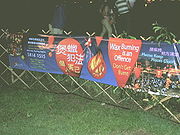
Wax burning
Encyclopedia

Most of the time, it refers to a local tradition of Hong Kong
Hong Kong
Hong Kong is one of two Special Administrative Regions of the People's Republic of China , the other being Macau. A city-state situated on China's south coast and enclosed by the Pearl River Delta and South China Sea, it is renowned for its expansive skyline and deep natural harbour...
youths during the Mid-Autumn Festival
Mid-Autumn Festival
The Mid-Autumn Festival , also known as the Moon Festival or Mooncake Festival or Zhongqiu Festival, is a popular lunar harvest festival celebrated by Chinese and Vietnamese people. A description of the festival first appeared in Rites of Zhou, a written collection of rituals of the Western Zhou...
period in public parks or other such areas. One would use an empty moon cake tin as the container to bring candle wax to the boil, possibly adding newspaper scraps or other flammable fuel. Once wax fire
Wax fire
A wax fire is created when melted or boiling wax is doused in water. The following reaction creates a large fireball or enlarges the flame of the already existing fire incredibly...
reaches its peak, one would pour water onto the flames thus creating spectacular sizzling and steam. This practice is dangerous due to the flames' kickback and volatile amount of flowing hot wax, possibly causing third degree burns; several children have been taken to the hospital each year due to "wax burning" related injuries. The annual numbers are in decline due to legislation and public education campaigns (see below).
Attitude of the Hong Kong government to wax burning
As there are many revellers during the Mid-Autumn FestivalMid-Autumn Festival
The Mid-Autumn Festival , also known as the Moon Festival or Mooncake Festival or Zhongqiu Festival, is a popular lunar harvest festival celebrated by Chinese and Vietnamese people. A description of the festival first appeared in Rites of Zhou, a written collection of rituals of the Western Zhou...
, the Hong Kong Police Force
Hong Kong Police Force
The Hong Kong Police Force is the largest disciplined service under the Security Bureau of Hong Kong. It is the world's second, and Asia's first, police agency to operate with a modern policing system. It was formed on 1 May 1844, with a strength of 32 officers...
has previously paid little attention to wax boiling, and hence many local youths see the festival as a chance for "legal fire-setting". However, due to the amounts of leftover melted wax in public areas and the inherent danger of the practice, in 1990 the Hong Kong Government began issuing public announcements to citizens not to boil wax. The Leisure and Cultural Services Department
Leisure and Cultural Services Department
The Leisure and Cultural Services Department , often abbreviated as LCSD, is a department in the Government of Hong Kong. It reports to the Home Affairs Bureau, headed by the Secretary for Home Affairs. It provides leisure and cultural activities for the people of Hong Kong, which was also one of...
began patrolling public parks and areas during the three-day festival period, requesting citizens not to light too many candles at once and to prevent wax burning.
Offenders burning wax in public parks, beaches or barbecue areas face a maximum penalty of HK$2,000 and 14 days imprisonment. The Housing Department (HD) also prohibits the practice, claiming that five points deduction and a $1,500 fixed penalty notice will be imposed on offenders in its public housing estate
Public housing in Hong Kong
Public housing in Hong Kong is a set of mass housing programmes through which the Government of Hong Kong provides affordable housing for lower-income residents. It is a major component of housing in Hong Kong, with nearly half of the population now residing in some form of public housing...
s. Leaving behind wax stains in public places will also fall under "littering" and is liable to a HK$1,500 fine.

